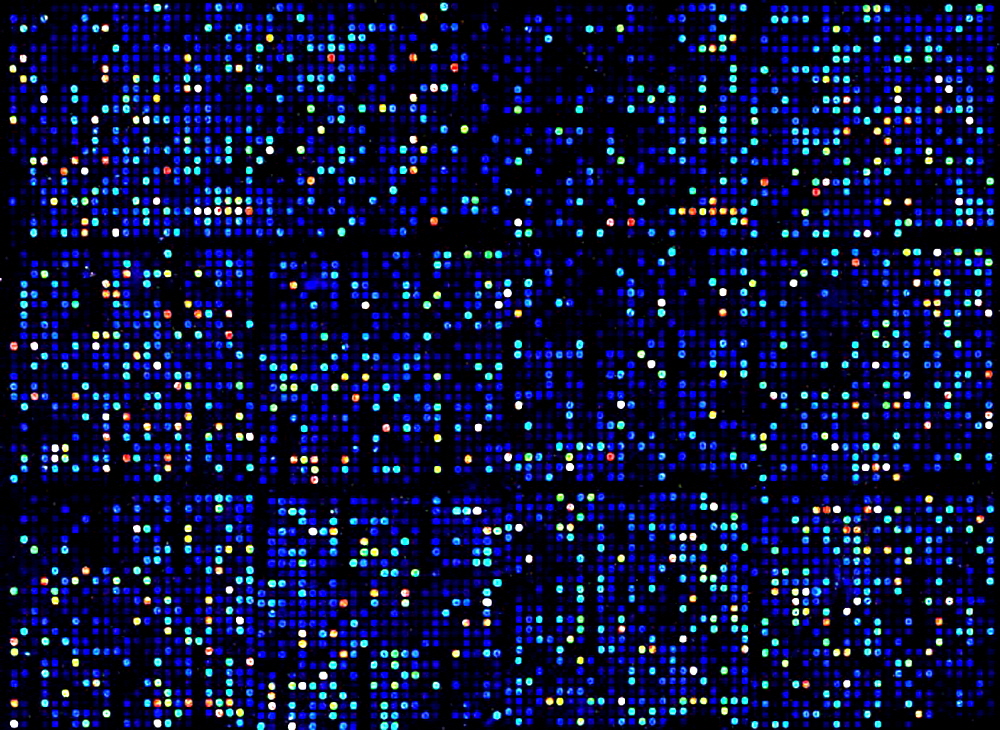mRNA Amplification
Data Sheet
![]() Shop this product in our online store
Shop this product in our online store
Arrayit | Messenger RNA mRNA amplification copies gene expression genotyping microarrays life sciences research
Reagents - Microarray Labeling - mRNA Amplification Kits for DNA Microarray Applications in Human, Plant and Animal Genome Analysis

Arrayit has developed the most robust, comprehensive and complete kits available for mRNA amplification. The ArrayIt MiniAmp mRNA amplification kit is optimized to use 50 ng-1 µg of total cellular RNA as starting material, and is highly recommended for use with our H25K Whole Human Genome Chip.
The mRNA amplification process includes the following steps:
- First Strand full length ds cDNA Synthesis: Featuring RT Booster, a proprietary ionic based enhancer solution that improves reverse transcriptase activity resulting in an increase in both the yield and the amount of full length cDNA products.
- Linear and exponential second strand cDNA Synthesis.
- Amplification of ds cDNA.
- High yield cDNA Purification of ds cDNA.
- High yield in-vitro transcription with T7 RNA Polymerase: Featuring T7 Booster, a proprietary blend of enhancers to augment the polymerase activity resulting in an increase in both the yield and the amount of full length transcripts. Special proteins are added into this enhancer mix that protects the nascent RNA strand during synthesis.
- Amplified RNA Purification.
- If used properly this kit will generate 5-50 µg of amplified sense strand mRNA ready for labeling with amino allyl dUTP based labeling.
Can be used stand alone or in conjunction with:
- Indirect Amino Allyl Fluorescent Labeling Kit
- Universal Reference mRNA for Human, Mouse and Rat
- Micro-Total RNA Extraction Kit
Table of Contents
- Introduction
- Quality Control
- Product Advantages
- Kit Contents
- Technical Assistance
- Requirements
- Equipment Requirements
- Short Protocol
- Complete Protocol
- Ordering Information
- Warranty
Introduction
Congratulations on taking a big step towards improving the economies of scale, quality and speed of your genomics research. This booklet contains a complete set of protocols outlining the steps and principles needed to use ArrayIt® MiniAmp mRNA amplification kit.
Quality Control
TeleChem assures the performance of this product. The finest scientific research went into the development of this product. Rigorous quality control monitoring on a lot-by-lot basis guarantees that the ingredients conform to the highest industry standards.
Product Advantages
- Fully compatible with H25K Whole Human Genome Chips.
- The most comprehensive kit available
- Robust RT reaction; allows full length cDNA synthesis with unique primers
- Unique second strand synthesis: takes the advantage of both linear and exponential amplifications
- cDNA purification using unique columns that minimize loss
- Optimized T7 reaction with unique additives, resulting in a huge incremental yield
Kit Contents
Item |
Packaging |
Storage |
Enzyme Mix 1 |
16.5 µl in 0.5 ml tube |
-20°C Freezer |
RT Booster (enhancer solution) |
50 µl in 0.5 ml tube |
-20°C Freezer |
Reaction buffer 1 |
50 µl in 0.5 ml tube |
-20°C Freezer |
dNTP Mix |
40 µl in 0.5 ml tube |
-20°C Freezer |
DTT |
50 µl in 0.5 ml tube |
-20°C Freezer |
Primer 1 Mix |
11 µl in 0.5 ml tube |
-20°C Freezer |
Primer 2 |
11 µl in 0.5 ml tube |
-20°C Freezer |
Primer 3 |
22 µl in 0.5 ml tube |
-20°C Freezer |
Primer 4 |
11 µl in 0.5 ml tube |
-20°C Freezer |
Enzyme Mix 2 |
11 µl in 0.5 ml tube |
-20°C Freezer |
Reaction Buffer 2 |
150 µl in 0.5 ml tube |
-20°C Freezer |
DNA Binding Buffer |
1.1 ml in 2 ml tube |
Room Temp |
DNA Wash Buffer Concentrate |
0.5 ml in 8 ml bottle |
Room Temp |
DNA Micro Column |
10 each |
Room Temp |
Elution Tube (1.5 ml) |
10 each |
Room Temp |
2 ml Wash Tube |
10 each |
Room Temp |
Nuclease Free Water |
1.5 ml in 2 ml tube |
-20°C Freezer |
Enzyme Mix 3 |
22 µl in 0.5 ml tube |
-20°C Freezer |
NTP Mix |
79.2 µl in 0.5 ml tube |
-20°C Freezer |
Reaction Buffer 3 |
22 µl in 0.5 ml tube |
-20°C Freezer |
DNAse |
11 µl in 0.5 ml tube |
-20°C Freezer |
Sodium Acetate Solution |
50 µl in 0.5 ml tube |
-20°C Freezer |
Linear Acrylamide |
20 µl in 0.5 ml tube |
-20°C Freezer |
Technical Assistance
Please contact us if you have any comments, suggestions, or if you need technical assistance. By electronic mail: arrayit@arrayit.com (under the subject heading please type ArrayIt technical assistance). By email: arrayit@arrayit.com, Monday—Friday PST 9:00am - 4:30pm. Please remember that we want to hear about your successes!
Requirements
Items needed but not supplied:
- Ethanol 100%
- Ethanol 70%
- Ice for incubation
- PCR tubes
Equipment needed:
- Thermal cycler
- Refrigerated microfuge capable of 10,000 rpm or more
- Micropipettors
- Vortex mixer
- Homogenizer (if using tissue)
- Temperature regulated water bath or dry bath
IMPORTANT NOTE: Spin all tubes briefly before opening.
Short Protocol
This kit is optimized to use 50 ng-1 µg of total cellular RNA as the starting material, and will generate 5-50 µg of amplified sense strand mRNA suitable for labeling with aminoallyl dUTPs.
The process requires the following steps:
1. Perform first strand cDNA synthesis.
2. Perform second strand cDNA synthesis.
3. Amplify the double-stranded (ds) cDNA.
4. Purify the double-stranded cDNA.
5. Transcribe the ds cDNA with T7 RNA polymerase in vitro.
6. Purify the amplified RNA (aRNA).
7. Perform cDNA synthesis on aRNA using aminoallyl-labeled dNTPs.
Complete Protocol
1. Perform first strand cDNA synthesis.
To a PCR tube on ice, add the following:
- Total cellular RNA (50 ng-1 µg) 1-10 µl
- Primer 1 Mix 1 µl
- Nuclease-free water 0-9 µl
Total volume 11 µl
Incubate PCR tube at 65°C for 5 min to denature the RNA.
Incubate PCR tube at 20-25°C for 10 min to allow primer annealing.
Add the following to the PCR tube:
- RT Booster (enhancer solution) 2 µl
- Reaction Buffer 1 2 µl
- Enzyme Mix 1 1.5 µl
- dNTP Mix 1.5 µl
- Primer 2 1 µl
- DTT 1 µl
Total reaction volume 20 µl
Incubate in a PCR machine at 42°C for 60 min.
Incubate at 95°C for 5 min to inactivate the reverse transcriptase.
Chill on ice for 5 min.
Spin tube briefly to consolidate the 20 µl sample.
Return tube to ice before proceeding to next step.
2. Perform second strand cDNA synthesis.
To the PCR tube on ice, add the following:
- Enzyme mix 2 1 µl
- Reaction buffer 2 10 µl
- dNTP mix 2.5 µl
- Primer 3 2 µl
- Nuclease-free water 14.5 µl
Total reaction volume 50 µl
Using a thermal cycler, perform the following steps:
- Incubate at 37°C for 10 min
- Denature at 98°C for 40 sec
- Anneal at 60°C for 30 sec
- Extend at 72°C for 4 min
- Incubate at 4°C for 5 min
3. Amplify the double-stranded (ds) cDNA.
Spin PCR tube briefly to consolidate the 50 µl sample.
Add 1 µl of Primer 4.
Using a thermal cycler, perform 5-10 cycles of PCR in a thermal cycler depending on the starting amount of RNA. When starting with 50ng of total RNA or 2500 cells perform 10 cycles, when amplifying form 1 1 µg of total RNA or 50,000 cells perform 5 cycles:
- Initial Denaturation 98°C for 2 min
- Cycle 5-10 times using 98°C for 30 sec, 60°C for 30 sec, and 72°C for 4 min
- Extend 72°C for 10 min
- Incubate 4°C for 5 min
Spin briefly to collect all the liquid.
4. Purify the double-stranded cDNA.
Note: To prepare the DNA Wash Buffer, add 2 ml of 100% ethanol to the DNA Wash Buffer Concentrate.
- To the PCR tube, add 100 µl of DNA Binding Buffer.
- Load the entire contents onto a DNA micro column.
- Place the column in a 2 ml wash tube.
- Spin for 1 min at full speed in a microfuge (>10,000 rpm).
- Discard the flow-through and reuse the wash tube.
- Add 100 µl of DNA Wash Buffer to the column.
- Spin at full speed (>10,000 rpm) for 1 min.
- Discard the flow-through and reuse the wash tube.
- Add 100 µl of DNA Wash Buffer to the column.
- Spin at full speed (>10,000 rpm) for 2 min.
- Discard the 2 ml wash tube.
- Place the column containing the sample into an elution tube.
- Add 8 µl of nuclease-free water (pre-warmed to 60°C) to the center of the column.
- Wait for 2 min and spin at full speed (>10,000 rpm) for 1 min.
- Re-load the filtrate onto the column.
- Wait for 2 min and spin at full speed (>10,000 rpm) for 1 min.
- Use the 8 µl ds cDNA sample in Step 5 (discard the column).
5. Transcribe the ds cDNA with T7 RNA polymerase in vitro.
Note: Set up the T7 reaction at room temperature. If Reaction Buffer 3 contains a white precipitate, incubate the buffer at 37°C and allow to cool to room temperature before setting up the reaction.
To a PCR tube at room temperature, add the following:
- Purified ds cDNA 6.8 µl
- Reaction Buffer 3 2 µl
- NTP Mix 7.2 µl
- DTT 2 µl
- T7 Booster (Enzyme Mix 3) 2 µl
Total Reaction Volume 20 µl
Incubate in a PCR machine at 37oC for 30-60 mins.
Use 30 mins when the starting total RNA is 1mg and 60 mins when the starting total RNA is 50ng.
Chill on ice for 5 min. and briefly spin to collect all the liquid.
Spin briefly to consolidate the 20 µl sample.
6. Purify the amplified RNA (aRNA).
- To the PCR reaction tube, add 1 µl of DNAse.
- Incubate at 37°C for 15 min.
- Chill on ice for 5 min.
- Spin briefly to consolidate the 21 µl sample.
- Add 2 µl of Sodium Acetate Solution.
- Add 50 µl 100% ethanol.
- Add 1 µl of Linear Acrylamide.
- Mix gently by pipeting.
- Incubate at -20°C for 20-30 min to precipitate the aRNA.
- Spin for 15 min (4°C) at full speed in a microfuge (>10,000 rpm).
- Remove the supernatant carefully and discard.
- Rinse the pellet gently two times with 200 µl of 70% ethanol.
- Dry the aRNA pellet by vacuum centrifugation (can store indefinitely at -80°C).
- Re-suspend aRNA pellet in 25 µl nuclease-free water.
7. Perform cDNA synthesis on aRNA using aminoallyl-labeled dNTPs.
- Obtain 25 µl aRNA sample from Step 6.
- Transfer 2 µl in 100 µl of water.
- Quantify spectrophotometrically by measuring the optical density (OD) at 260.
- Use 1-2 µg of aRNA for labeling using the aminoally labeling kit.
- Use 1-2 µg of Universal Reference mRNA as a control for aminoallyl labeling.

